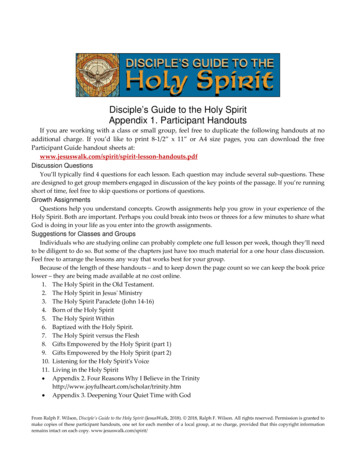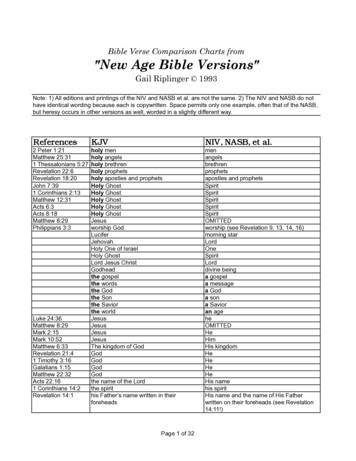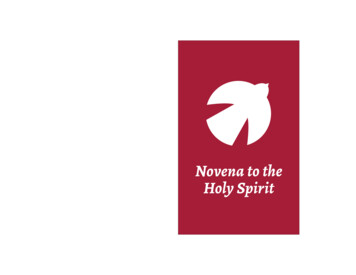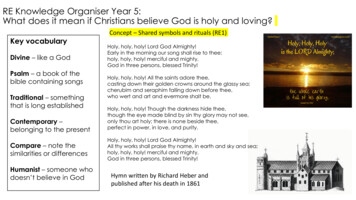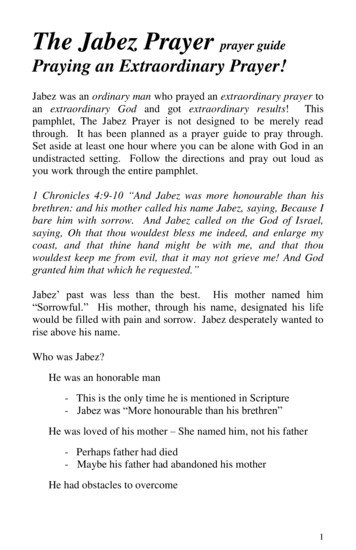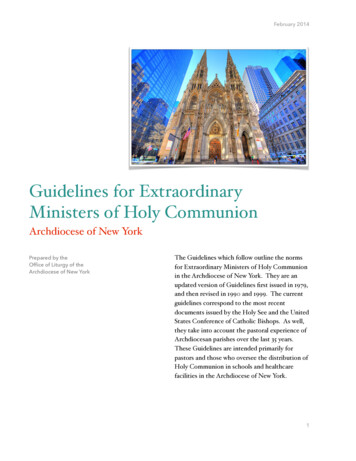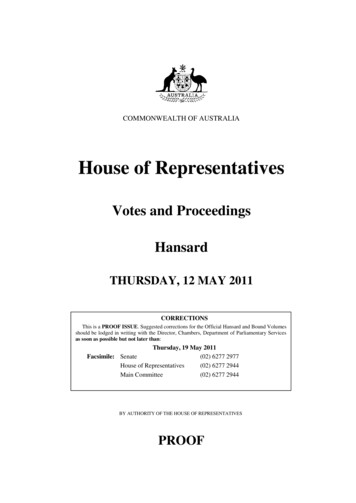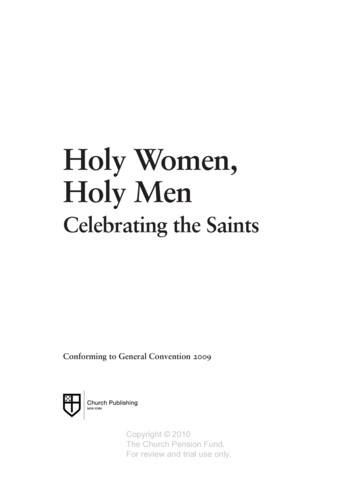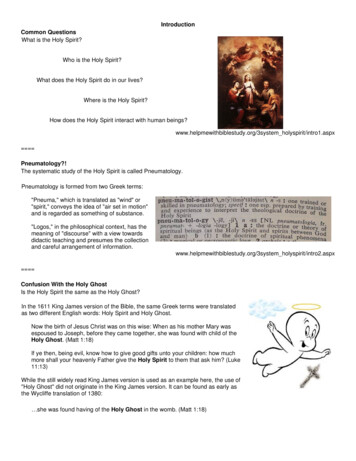
Transcription
ExtraordinaryMinister of HolyCommunion &Lectors TrainingManualUpdated 11/18/2019
Eucharist Ministry Team:Fr. Stephen MocioPastor, St. Patrickfrmocio@saintpats.net903-463-3275Deacon Gary VogelDeacon, St. Patrickdeaconvogel@icloud.com903-813-6324Lisa LinneburMinistry 6290Welcome to the Ministry of ExtraordinaryMinister of the Eucharist and Lector!"The Eucharist constitutes the very life of the Church, for the Lord said, I am the bread of life. No onewho comes to me shall ever be hungry, no one who believes in me shall ever thirst." "In every celebration of theEucharist there should always be a sufficient number of ministers for the distribution of the Eucharist. Priority isalways given to ordinary ministers (bishops, priests, deacons) and auxiliary ministers (instituted acolytes). Whenthere are large numbers of the faithful present and there are insufficient ordinary and auxiliary members athand, special or extraordinary ministers properly appointed beforehand should assist in the distribution ofCommunion." (HLS #29). This booklet is designed to assist you in your participation in the Liturgical Ministry ofExtraordinary Minister of the Eucharist (more commonly known as Extraordinary Minister), here at St. PatrickParish. Your willingness to serve as an Extraordinary Minister of the Eucharist, reflects not only response to yourBaptismal call to serve the people of God, but a commitment to Christ as you share in the preaching, teachingand leading aspects of the church. You offer the Eucharist, recognize the Body of Christ in those to whom youoffer Eucharist and ultimately you act as the Body of Christ by fully participating in the life of the parish and thewider community. Your willingness to commit to a monthly schedule, to prepare properly for your service and toarrive on time dressed appropriately for Mass, further reflects that commitment.The ministry of the lector is one of the most important ministries restored to the laity during Vatican II.The responsibility of proclaiming God’s Word for the Christian assembly is a humbling and deeply rewardingexperience. Scripture itself tells us that God’s word is “living and active.” His Word is not primarily a written textthat is fixed and codified, but a Word spoken and proclaimed in the midst of a community of faith. His Wordbrings forth creation and whenever it is spoken anew it recreates. It is by his Word that Israel was brought intobeing and continually challenged to renew its faithfulness to Him; it is by His Word that the Church was calledinto being and constantly challenged to renew and reform itself.Prayer for the Extraordinary MinistersGod of Love and Mercy. With reverence and humility, I approach the Eucharist and this ministry. Grant me thegrace to help others encounter You in this sacrament. I ask through Your Son, Jesus Christ our Lord. AmenPrayer for the LectorsLord, invest me with Your Power as I prepare to Proclaim the marvel of Your Message. I have prepared myreading, I have tried to take within me the meaning of what I am about to read: help me, I as, to read not justwith my lips but with my whole heart and soul. Lord, make me a hollow reed so that Your Voice will be heard byall who hear me. Free me of excessive concern over my performance, over the impression I create in the SacredAction. Convert my feelings of nervousness, turn all my apprehensions into an energy for proclaiming YourWord with power and authority. May Your Spirit fill me as it fills the Holy Words that I am about to proclaim.Amen
Canon LawCan. 230 §3 - When the need of the Church warrants it and ministers are lacking, lay persons, even ifthey are not lectors or acolytes, can also supply certain of their duties, namely, to exercise the ministry of theword, to preside offer liturgical prayers, to confer baptism, and to distribute holy communion, according to theprescripts of the law.Can. 910 §1 - The ordinary minister of Holy Communion is a bishop, presbyter, or deacon.§2 - The extraordinary minister of Holy Communion is an acolyte or another member of the Christian faithfuldesignated according to the norm of can. 230 §3Holy Communion under both Kinds (Species)From the first days of the Church’s celebration of the Eucharist, Holy Communion consisted of thereception of both species in fulfillment of the Lord’s command to “take and eat take and drink.”The practice of Holy Communion under both kinds at Mass continued until the late 11th century, whenthe custom of distributing the Eucharist to the faithful under the form of bread alone began to grow.By the 12th century, theologians speak of Communion under one kind as a “custom” of the Church. Thepractice spread until the Council of Constance in 1415 degreed that Holy Communion under the form of breadalone would be disturbed to the faithful. In 1963, the Fathers of the Second Vatican Council authorized theextension of the faculty for Holy Communion under both kinds at the Bishop’s discretion. (See Norms 18,19 &20)Holy Communion has a more complete form as a sign when it is received under both kinds. For in thismanner of reception a fuller sign of the Eucharistic banquet shines forth. Clearly, there are some pastoralcircumstances that require Eucharistic sharing in one species. (Norms 15)The Church has always taught the doctrine of concomitance, by which we know that under each speciesalone, the whole Christ is sacramentally present and we “receive all the fruit of Eucharistic grace.” (GIRM 281 &CCC 1390)QualificationsThe Lay Ministry Coordinator, after consultation with the pastor, issues an invitation in the name of thepastor to those parishioners that have deemed to be appropriate members of the ministry.Those invited to serve in this ministry are designated only for service in this parish. ExtraordinaryMinisters of the Eucharist should not take it upon themselves to bring Communion to a parent, family member,friend or neighbor, unless permission is given from the pastor or his designee, of the parish in which the personresides.Invitation to serve as an Extraordinary Minister of the Eucharist is a reflection of the diversity of theparish. An invitation to join the ministry does not mean that one is “better or holier than another”, nor is aninvitation indicative of a reward of some sort. Archdiocesan guidelines for invitation to service in this ministryclearly indicate that an invitation to serve . not create an elite in the church community.To be an Extraordinary Minister of the Eucharist you must: be a fully initiated Catholic (have received the sacrament of Confirmation) be in good standing with the church be a registered member of St. Patrick Parish be of good morale standing and cultivate devotion to the Holy Eucharist and distinguishthemselves by Christian life, faith and morals; striving to be worthy of this great office participate regularly in the sacramental life of the church and act as an example to the otherfaithful by piety and reverence for this Most Holy sacrament of the Altar be at least 16 years old
be duly instructedact as an example to the other faithful by piety and reverence for this Most Holy Sacramentof the Altar.Extraordinary Ministers should live the Sacrament of Life Practice your Catholic faith through aprayerful relationship with God. Take advantage of the sacraments regularly. If you have not been toconfession in a while, go before you start the process of becoming an Extraordinary Minister andcontinue to go regularly. To accomplish so great a work, Christ is always present in his Church, especiallyin her liturgical celebrations. By his power Christ is present in the sacraments, so that when a man baptizes it is reallyChrist Himself who baptizes. Christ is present in the sacrifice of the Mass, not only in the person of the minister, butespecially under the Eucharistic species. Christ is present in His word, since it is He who speaks when the Holy Scriptures are read inthe Church. He is present. Lastly, when the Church prays and sings, for He promised: “Where two or three aregathered in my name, the I am in the midst of them.”Extraordinary Minister SchedulingThe Extraordinary Minister of the Eucharist (EM) schedule will be updated every two months. Scheduleswill be e-mailed, posted on the St. Patrick website, posted on the bulletin board in the Sanctuary, and on thetable in the Confessional. If you are scheduled to serve and cannot, YOU are responsible for arranging for asubstitute via the Ministry Schedule Program or by emailing the EM Coordinator to have her request a sub foryou. If you cannot serve on a regular basis and would like to be on the substitute roster, please let the EMCoordinator know. A Liturgical Minister may perform only one liturgical ministry at a time, thus if you areperforming the function of Extraordinary Minister, you may not also perform the function of Lector at the sameMass unless we do not have enough volunteers or someone is absent.Holiday schedules for EMs will be done by signing up for the desired time slot on the Ministry Schedulerprogram. Examples are: The Triduum (Holy Thursday, Good Friday, Holy Saturday), Easter, Christmas, etc.Attire“Bodily demeanor (gestures, clothing) ought to convey the respect, solemnity and joy of the momentwhen Christ becomes our guest.” Catechism of the Catholic Church 1387bIn the dioceses of the U.S., acolytes, altar servers, readers and other lay ministers may wear the alb orother suitable vesture or other appropriate and dignified clothing. General Instruction of the Roman Missal 339Your respect for the Ministry should be reflected in your appearance and attire. Appropriate attireincludes being properly groomed, wearing a suit and tie, or clean, nicely creased trousers with a shirt and tie ornice sweater; pant suit, or skirt, or slacks with blouse/sweater. Jewelry or clothing which would be distracting tothe Assembly should not be worn. Wear your “Sunday Best”. However, in the case of emergency, if you arewearing jeans and a nice shirt (no shorts, t-shirts, or flipflops) you may fill in if you see we have a shortage ofministers.Extraordinary Minister Duties Before MassIf you are scheduled, please arrive no later than 10 minutes before the mass starts. If you are notscheduled and you would like to make yourself available as a substitute, please make sure to sit within the first10 pews of the church next to an isle. EMs are required to sit in the first 10 rows of the church. EMs should beseated at least five (5) minutes prior to start of mass. During special services like Christmas and Easter, we will
try to have reserved pews for you on St. Mary’s side. Please sit next to an aisle so that you can approach thealtar when necessary.Extraordinary Minister of the Eucharist Duties during MassThe mass will proceed through the readings, the homily, the Lord’s Prayer and the Sign of Peace. Afterthe celebrant changes the bread and wine into the Body and Precious Blood and the Priest has concluded hisown Communion, the drinking of the Blood of Christ, six (6) EMs should line up behind the altar facing the frontof the church in a single line. As the church has asked us to do, bow reverently before you receive the host andchalice. The Priest and/or Deacon will distribute the Body of Christ to the Ems. Once you have received thePrecious Body you will then go to the back of the line. Then the Deacon will distribute the Blood of Christ andthe chalice. Once the first EM in line to receive the precious blood has gotten their chalice, they will take it tothe fifth and sixth ministers. They will receive the blood of Christ before distributing to the parishioners or thosewho are handicapped or cannot stand.Distribution of the Body of ChristDistribution of the Body of Christ The U.S. Conference of Catholic Bishops has stated “The proper andonly permissible form for distributing Holy Communion is to offer the consecrated bread by saying, “The Body ofChrist” and to offer the consecrated wine by saying, “The Blood of Christ”. No other words or names should beadded; and the formula should not be edited in any way” (Cf. GIRM, 161; 284-287).Reverently hold up the consecrated host between you and the receiver and looking the receiver in theeye, smile and say “The Body of Christ”. Wait for the person receiving communion to say “Amen” and then placeit in their hand or on their tongue, depending on which method they prefer. If an adult or child comes up forcommunion and they have their hands crossed over their chest, place your hand on their upper arm or shoulderand say “Christ’s blessing on you” or another appropriate blessing. Do not place your hand on the head of a childor an adult. This can be offensive to some people and it is a health concern. EMs should not make the sign of thecross as part of the blessing, as they (EMs) are not ordained ministers.If you run out of consecrated hosts, tell the person who is the next in line to wait a moment, then go tothe Priest to get more. If your line finishes before the Priest, stand there reverently until everyone has receivedand then follow the priest back to the altar. Place the ciboria on the altar for the priest and then go to thesacristy to wait on the EMs distributing the Blood of Christ. It may be necessary for you to help them drink theremaining Blood of Christ.Distribution of the Precious BloodAfter you have received the precious Blood of Christ, place the purificator over the top of the chalice, sothat when you are moving to your position you don’t spill or splash. Reverently hold up the chalice between youand the receiver and looking the receiver in the eye, smile and say “The Blood of Christ”. Wait for the personreceiving to say “Amen” and then hand them the chalice. Make sure the person has a good grip on the chalicebefore releasing it. Be especially careful when the person hands the chalice back to you. The exchange should befirm but gentle; not forceful enough to cause a splash or a spill. Be even more vigilant when the communicant isa younger child. After the person has handed the chalice back to you, wipe the place on the chalice where theydrank, and turn the chalice a quarter turn. If you run out of Precious Blood, place your purificator over the top ofthe chalice and reverently stand until everyone has received. If you have Precious Blood remaining after allparishioners have received Communion, once again place your purificator over the top of the chalice as to notspill or splash the Precious Blood and proceed to the sacristy. Consume the remaining Precious Blood, place thepurificator back over the top of the chalice and place it in the designated area. If you prefer not to consume theremaining Precious Blood, offer it to another EM. Once all of the Precious Blood has been finished and the
chalices are in their designated place, you will all exit the sacristy together and proceed in a line in front of thefirst pew and bow together, then go back to you seat.AccidentsAccidents do happen from time to time, but our awareness of things will help this to, hopefully, nothappen. If an accident does occur, the most important thing is to remain calm, this will re-assure theparishioner that everything will be okay.If you drop the Consecrated Host, our calm demeanor at this moment can calm and assure an anxiousand embarrassed communicant. If they have received in the hand, pick up the Host and place it back in theciboria. If they have received on the tongue, hold it in the palm of your hand until after Communion is completeand take it directly to the sacristy. Place the Consecrated host in the bowl in the sacristy, next to the sink, and fillit with water.If you drop or spill the Precious Blood - DO NOT PANIC! Stop what you are doing. Your demeanor willreassure those communicants in line or, in particular, the person who may have caused the spill. Stop servingand place the purificator over the spill and position yourself over the spill until everyone has received. Thenleave the purificator over the spill and the Priest or Facility Manager will properly clean the spill.Ash Wednesday.If you are assigned to assist in one of the Ash Wednesday services, you will use the script"Remember, you are dust and to dust you will return." You mark each person’s forehead with the sign of thecross with your thumb while saying one of the scripts. After all ashes have been distributed Father will havesome wipes to clean your hands with before you go back to your seat.Eucharistic Ministry to the HomeboundCommunion Ministers to the Sick and Homebound are regularly appointed Communion Ministersassigned to the Catholic Parish of St. Patrick. You have volunteered to bring the Body of Christ to those unable toreceive in any other manner. This is truly a spiritually rewarding experience for all involved. Communion isscheduled to be brought to those who are sick, in nursing homes or homebound weekly at a regularly appointedtime. At any time, you are unable to complete the assignment, please call Deacon Gary.Sunday, after masses, is the recommended time to schedule this ministry. However, Sunday may not beconvenient for you or your recipients. If a weekday is selected, a key to the tabernacle is located in the parishoffice. After the hosts are obtained, return the key to the office. You may also bring your pyx up to communionwith you and the Priest/Deacon/EM will place the consecrated host in your pyx for taking communion to thehomebound, nursing home, or hospital.Timing of your visit is for your convenience and that of your recipients. Observe their condition andshorten or lengthen your time with them as you deem best for all. Remember, many lead a lonely life during theday and welcome the time you spend with them. If there are any problems or questions please Deacon Gary.Thank you for being involved in this ministry. To proclaim God's word in the midst of the assembly andto minister the Eucharist to one's fellow pilgrims are honored offices in the believing community. Those whocarry Holy Communion to the sick and persons otherwise confined, therefore, continue the community's act ofworship. They extend the community's embrace to include those unable to be physically present. It is mostfitting that they go directly from the Sunday or daily Eucharist to the sick or homebound.
TrainingAll who serve as ministers of Communion for the sick must attend special training sessions to becomeaware of all theological, pastoral, and procedural aspects of their service. Having appropriate knowledge andtraining will help ministers to function effectively and bring confidence and joy to their experience.The ministers should be properly instructed and should distinguish themselves by their Christian life. Inpreparing persons for this ministry, it would be good to help them grow in a number of areas of Christian living:in their understanding of the Eucharist, of ministry and service in the Church. It is important for them to realizethe need of good celebration as a sign and occasion of faith. The candidates should also be instructed in theways of giving Communion, and in the manner of celebrating when they bring Communion to the sick. Personalprayer, scripture reading, and witness are necessary for anyone who seeks to be a worthy minister of theChurch.The Eucharist for Communion outside a church is to be carried in a pyx. Communion must be given bythe authorized minister, who shows the particle of consecrated bread to the communicants and gives it to them,saying "The Body of Christ," to which the communicants reply "Amen." There should be no variations on saying,"The Body of Christ," such as "This is the Body of Christ," "Receive the Body of Christ," etc.Procedures and Pastoral Notes Concerning the Rite of Communion for theSick before VisitingCollect information about the person who is sick and any other helpful information for your visit to the home orhospital. As you begin the visit: Share greetings and introductions; give some ideas from the homily and the bulletin if the person showsinterest in the parish. After listening to the conditions and desires of the person who is sick, ask if the person desiresCommunion at this time. Invite the family to receive Communion also. Choose a Scripture reading fromthe Sunday readings. Be aware of the need for short and comforting passages. The reading(s) shouldhelp those present to reach a deeper understanding of the mystery of human suffering in relation to thepaschal mystery of Christ.The RitePace the ritual with sensitivity. Be aware of the sick person's ability to follow. Adapt to the situation ofeach visit. If the family suggests setting a simple table with candles, and holy water, agree with this but do notinsist upon it when the family is not ready or unfamiliar with the practice. Give a small portion of the host to aperson who has difficulty swallowing. When distributing the Eucharist in a facility, check with the nurse in casesof special feeding. Wait for the person to swallow the host. Offer water if necessary. Be prepared with a cloth ortissue if the person may have problems. Take time to pray reverently and to be present with the sick person andthe family. Be sensitive to the proper time to depart.Practical Considerations for Ministers of Communion for the SickKnow that the relationship with the person who is sick is a key factor. The minister brings the comfortand the concern of Christ. Be aware of feelings that may arise when you enter a person's home or room, theperson's appearance, medical equipment; the environment. When it is difficult to look at the person because oftheir physical condition, concentrate on their eyes. Take proper time for introduction and personal sharing.Listen attentively. If you are uncertain or suspect sensitive conditions, check with the family or the nurse for
more information. Be sensitive to feelings of loneliness and depression. Consider the situation and desires of theperson who is sick and make decisions based on this information before beginning the St. Patrick CommunionMinistry to the Homebound Communion rite. Be prepared in the face of refusal or rejection by either the personwho is sick or by a family member. Be ready to offer modified services in such cases or a simple Lord’s Prayer. Ifthe person does not wish to share Communion at this time, ask if they would like to share in a short blessingprayer. Be aware of making referrals when other services are needed. (confessor, counselor, doctor, etc.) Do nottry to solve problems. If the sick wish to celebrate the sacrament of penance, encourage them or the family tobe in contact with the Parish Office. You might also offer to relay the message yourself. Keep confidences at alltimes. The parish staff or Deacon Gary is available to those visiting the sick in order that they might share theirfeelings and experiences.Acceptance of GiftsIn the course of visiting a person sometimes gifts or benefits may be offered, as a personal courtesy.Gifts and benefits may be offered out of gratitude and goodwill for a job well done. However, gifts and benefitscan also be offered as a subtle form of influence to create a favorable impression or to gain preferentialtreatment. This in turn may give rise to a conflict of interest and breach of boundaries. Acceptance of a gift orbenefit can create a sense of obligation that may compromise the therapeutic relationship. You may only acceptgifts of “negligible value” and very infrequently. If a recipient insists on giving a “gift,” ask the recipient to givethe item to a charitable organization or to make a donation to the church, possibly for the “Communion to theHomebound Ministry.”What should I do if the host is dropped or the person removes it fromhis/her mouth?If the host is dropped and there are no health concerns, the host may be picked up and consumed. If thedropped host presents health concerns or the person removes the host from his/her mouth, it should bedissolved in water and the water poured onto the ground at church, not down a drain. Of course, if anyonedeclines or refuses ve the mic so that it is 6 to 9 inches away fromyour mouth. This will ensure that you will be heard.When you read, take a moment to find what you are reading. Take a deep breath and then it's better tomemorize the first part "A reading from the ." so that you can look at the parishioners. Then take adeep breath and take your time reading in a loud clear voice. We aren't in a race. When you read alittle slower it gives you time to know what word is next and you have time to pronounce the wordsclearly. During the reading it is perfectly acceptable to not look up until you are finished. When you getto the end of the reading, take a deep breath and look at the parishioners to say, "The Word of theLord".When you are finished reading look at the doors, the cantor should be standing there ready to go, if notyou will be reading the response. Usually our Music Minister will let you know before Mass that you willneed to do the response.
After you have finished reading, please turn the page (if needed) for the second reader. For shorterreadings this may not be necessary. This is also another reason to make sure of what the pages look likebefore mass.Return to your seat WITHOUT bowing, by way of the North side, not the center isle.Second Lector Please read the first reading instructions, I won't repeat them as most of them are the same.Again, getting there early will give you time to go over the prayers of the faithful. If it is helpful to you,you may take them to your seat to go over. This will also give you time to double check that the correctreadings are ready to go and that the ribbon is where it makes it easy to turn the page. In case the firstreader forgets to turn the page.Make sure that you stand in front
Lectors Training Manual Updated 11/18/2019 . Eucharist Ministry Team: Fr. Stephen Mocio Deacon Gary Vogel Lisa Linnebur Pastor, St. Patrick Deacon, St. Patrick Ministry Coordinator frmocio@saintpats.net deaconvogel@icloud.com ministryscheduler@saintpats.net 903-463-3275 903-813-6324 903-271-6290 .

